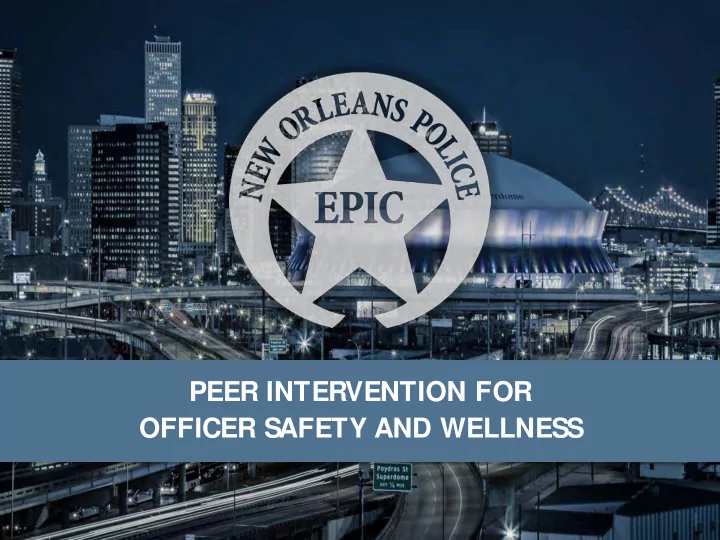

PEER INTERVENTION FOR OFFICER SAFETY AND WELLNESS
EPIC OVERVIEW 2
What Is EPIC?
History of EPIC
EPIC Is About: EPIC Is Not:
Why Do We Need EPIC?
How Does EPIC Work?
Peer Intervention
EPIC and Wellness
ACTIVE BYSTANDERSHIP
Passive vs. Active Bystandership
Basis in Social Science
Inhibitors
The Risks of Non-Intervention
Legal Risks
Key Points
How Can EPIC Help?
What Do We Get Out of It?
POLICING IS RISKY
Physical Risks
Physical Wellbeing
Mental Risks
Mental Wellbeing
Real Problems Facing Us
Officer Survival
FOCUS ON WELLNESS
Unmanaged Stress
Alcohol Dependency
Driving While Intoxicated
Criminal Charges/Job Loss
How Do We Avoid All This?
What’s Next in Wellness
What Is OAP?
What Is Peer Support?
Wellness Benefits
Barriers to Building Wellness
Breaking the Culture of Silence
Successful Intervention
Recognizing Triggers
Performance Recovery
Adaptive Coping
Maladaptive Coping
Indicators of Acute Stress
At-Risk Behavior
Warning Signs of Alcohol and Substance Abuse
PEER INTERVENTION
Successful Intervention
Collective Responsibility
When to Intervene
How to Intervene
Keys to Effective Intervention
Reporting
Retaliation Is Prohibited
Levels of Peer Intervention Level 1 Level 2 • Everyday interactions of • Formal team friends, co-workers, and • Trained in peer support others providing support • No advice-giving • Friends/peers talking, • Guided by ethical and giving advice conceptual parameters • Can consist of a one-time • Clinically advised or contact or ongoing supervised by a licensed interactions mental health professional • Can effectively resolve • Includes a safety situations, but Level 2 assessment – has an intervention may be evaluative component needed • Interactions are • Can be destructive protected by without proper training Confidentiality and approach
Peer Assistance Specialists
SUPPORTING EPIC AS A SUPERVISOR
Department-Wide Implementation Field Training Command Officers embraces embody EPIC EPIC Internal Affairs Supervisors protects officers support active who intervene bystandership Recruit EPIC infused EPIC-minded in training officers Part of daily life of units in the field
Being an EPIC Mentor
Use Your Experience
Acknowledge the Difficulties
Role Plays
tbean@nola.gov lakurtz@nola.gov pmnoel@nola.gov
Recommend
More recommend